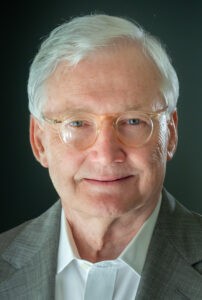The Southern Baptist Convention continues on its crusade to rid Baptist churches of women in ordained leadership of any kind. I have looked with dismay at its inexorable path of patriarchal power and the denigration of women.
So churches with women in pastoral roles are now to be excised from the SBC, and next year there will be an additional resolution on a constitutional amendment that women cannot be given the title of pastor. They’ve got to make it clearer and clearer, they say.
And we follow a Lord — if you want to bring Jesus into it — who, not fond of titles, said: “They love to have the place of honor at banquets and the best seats at synagogues, and to be greeted with respect in the marketplace and to be called rabbi. But you are not to be called rabbi.”

Stephen Shoemaker
My working definition of what a sacrament in the church has been through the centuries is this: whatever we won’t allow women to do. If the chief sacrament is the Eucharist and presiding at Communion, then that’s what women cannot do. If it is preaching, that is what women cannot do.
What the SBC has been insistent to make clear since 1984 is what women must not be allowed to do is attain the pastoral office with its requisite role as having authority over the congregation. So its chief sacrament is power.
Alarmed by the “super apostles” who had come into Corinth to take over, Paul wrote in his Second Letter to the Corinthians, “Not that we lord it over your faith; we work with you for your joy.” And Jesus told his disciples vying for power they were not to be like the leaders among the Gentiles who “lorded it over” others.
They tout what they call “biblical authority.” Those are the words of Al Mohler, president of Southern Baptist Theological Seminary, who spoke twice at the convention last week in defense of the motion. I knew Al when I was pastor of Crescent Hill Baptist Church near the campus and he was a doctoral student. As an assistant to the president of the seminary, Roy Honeycutt, he asked me among others to give money to place a full-page ad in the Louisville Courier-Journal decrying the resolution at the 1984 Southern Baptist annual meeting against women being pastors.
“As a brother in Christ, I wish him no ill, but I think ill of his theology on such matters.”
Years later, he said a conversation with conservative theologian Carl F.H. Henry on the campus of the seminary changed his mind and convinced him of the error of his thinking on women as pastors. As a brother in Christ, I wish him no ill, but I think ill of his theology on such matters. And I wonder about how different our understanding is of the Christ we follow — this Jesus whom we know imperfectly.
Here is the crux of it for me: The way of Jesus in his earthly ministry. He was the one who, as Paul put it, emptied himself of authority as he became human. Jesus repeatedly told his disciples as they hungered for earthly authority that they were missing the point of it all. There was, as theologian Hans Kung put it, “a downward bent” to Jesus’ ministry — not an upward reach. He took a towel and washed his disciples’ feet, normally the role of a servant or wife of the host. Jesus the servant, the wife. He chose not to rule but to serve.
Luke records there were three women in his inner circle of disciples — Joanna, wife of Herod’s steward (what a story that must have been), Suzanna and Mary Magdalene, who was the first to whom the Risen Jesus appeared, and whom Jesus made the first evangelist of the Resurrection and whom the early church called, “apostle to the apostles.”
Paul lists in the letter to the Romans a woman named Phoebe who was a “deacon” (diakonon) of the church at Cenchreae. Through the centuries, the Greek word has been translated “servant” or “helper.”
“The doctrine of biblical infallibility always has people lining up to be its infallible interpreters.”
Every translation is an interpretation, so the question comes: Who has the authority to be the grand interpreter of Scripture? The doctrine of biblical infallibility always has people lining up to be its infallible interpreters. The Baptist way always has emphasized what was called “soul competence” and “soul liberty” that, along with the autonomy of the local church, meant every person and every church has the spiritual competence and spiritual freedom to open the Bible and, led by the Spirit, interpret it for their own life in Christ.
The current passions of the culture aim toward authoritarianism and hierarchies everywhere. The SBC seems more captive to culture here than to the word of God, as the church through the ages often has been.
Jesus exemplified the non-hierarchical way of the kingdom when he said to his disciples: “I no longer call you servants … but friends” and, “Greater love has no one than this, than to lay down their life for a friend.”
Instead of hankering after “biblical authority,” our pastors should take on Jesus’ role as a friend. Maybe we should rename pastors “friends.” We would have less to argue over if we did.
The Spirit is calling remarkable women in the church all over the land to be pastors. Let us not grieve the Spirit of God.
Stephen Shoemaker serves as pastor of Grace Baptist Church in Statesville, N.C. He served previously as pastor of Myers Park Baptist in Charlotte, N.C.; Broadway Baptist in Fort Worth, Texas, and Crescent Hill Baptist in Louisville, Ky.
Related articles:
The best way to protest the SBC is to carry on and preach louder | Opinion by James Willis III
Baptists, football and women who changed the game | Opinion by Eileen Campbell-Reed
My ordination is precious to me | Opinion by Susan M. Shaw
The cost of being comfortable is too high | Opinion by Felicia Caid Smith
Jesus said it: The ministry of women is good news | Opinion by Andrea Corso Johnson
A 1984 prediction comes true for the SBC | Opinion by Mandy McMichael


